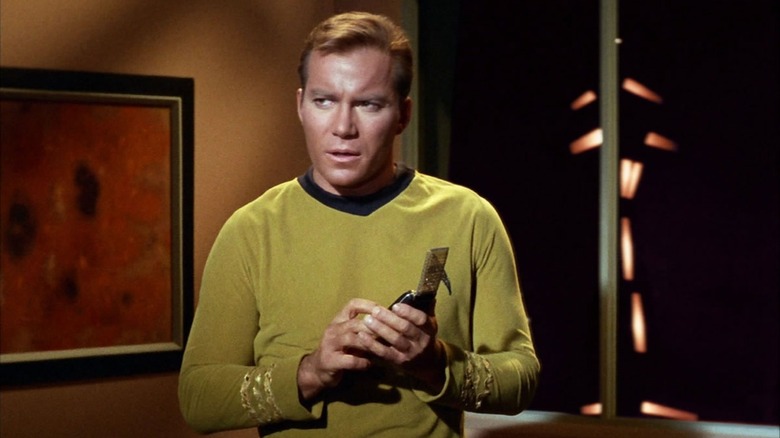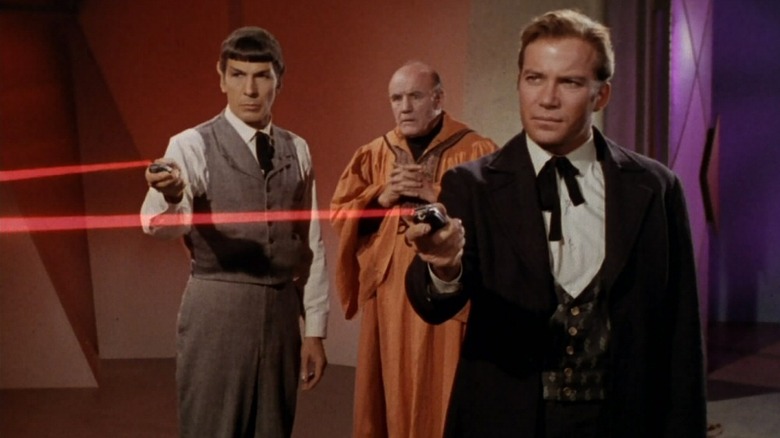Here's How Many Star Trek Starfleet Regulations Kirk Violated As Captain Of The Enterprise
Captain Kirk has a reputation in popular culture that he doesn't entirely deserve. Many non-Trekkies have gotten the impression — through a general avenue of cultural osmosis — that Kirk is a reckless, rules-hating cowboy, eager to thumb his nose at authority and fracture whatever directives he happens to be presented with. While Kirk is generally suspicious of authority figures, he is also an authority figure himself, and tends to remain level-headed and judicious in most scenarios. Indeed, while many tend to see Kirk as a brusque pugilist, other characters have described him as the opposite. In "Where No Man Has Gone Before" (September 22, 1966), a colleague says that he is "a stack of books with legs." Kirk is just as much a nerd as he is a jock.
But some of Kirk's reputation for recklessness is indeed warranted. Even casual Trekkies may be able to recall a few instances when Kirk violated the Prime Directive, completely undoing a planet's natural evolution because he found it objectionable. Example: "The Return of the Archons" (February 9, 1967), an episode wherein Kirk found a planet ruled by a psychic computer that was controlling the thoughts and behaviors of its enslaved humans. The Prime Directive would have forced Kirk to leave the computer alone. It's creepy, but not illegal. Kirk, instead, destroyed the computer. That had to be a violation of some kind.
It seems that the authors of IDW's "Star Trek" comics finally decided to put a number on Kirk's subordination. In the issue "Star Trek: Defiant" #5, published in July of 2023 and written by Christopher Cantwell, Worf, in command of the U.S.S. Defiant, has a conversation with Spock. Spock recalls every time Kirk broke Starfleet protocols. The number was a surprisingly high 234 times.
234 acts of subordination
Spock's exact dialogue is as follows:
"The greatest captain I ever had the privilege of serving under violated 234 Starfleet regulations during his tenure, disobeyed direct orders 19 times, and the Prime Directive several more than that, and was — remarkably — only court-martialed twice."
Spock brings it up as a way of motivating Worf, who is undergoing a crisis of confidence. Worf had just stolen the Defiant with the intention of rescuing his son Alexander from an evil version of Kahless, the Klingon emperor, and he is wondering if he did the right thing. Spock notes that while Kirk and Worf are very different people, they share similar convictions.
Being compared to Kirk is, of course, a high compliment within "Star Trek" canon. Most of the main characters in all the "Star Trek" shows become famous for their derring-do, and Worf would have studied the exploits of Captain Kirk while attending Starfleet Academy. There's something comforting about the fact that "Star Trek" also contains Trekkies, and that watching reruns of the original series is an important piece of history class.
Kirk's biggest punishment for his violations was a demotion from Admiral to Captain at the end of "Star Trek IV: The Voyage Home," a punishment that was more like a reward. As a captain, he was given his own ship and allowed to be an adventurer again, something he very much wanted. Kirk never faced serious consequences for his crime. Well, at least not from Starfleet. He would, quite tragically, get his crew and/or family killed from time to time, and that always weighed heavily on him. Luckily, Kirk was not a sociopath, and moved forward with sensitivity and caution.

